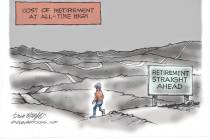Obama administration not keeping promise
Transparency "promotes accountability and provides information for citizens about what their government is doing," President Barack Obama said shortly after taking office, vowing to outdo his predecessors when it came to improving openness and disclosing requested information more rapidly.
Monday, a day before the Senate Judiciary Committee was scheduled to open hearings on the Obama administration's progress toward that goal, The Associated Press released its own evaluation, which it summarized as "decidedly mixed."
"Two years into its pledge to improve government transparency, the Obama administration took action on fewer requests for federal records from citizens, journalists, companies and others last year even as significantly more people asked for information," AP reported for Sunshine Week.
The December 2009 directive requires every agency to take immediate, specific steps to open their operations to the public. "But the White House Office of Management and Budget blacked out entire pages of some e-mails between federal employees discussing how to apply the new openness rules, and it blacked out one e-mail discussing how to respond to AP's request for information about the transparency directive," the news service reports.
The administration refused to release any sought-after materials in more than one-third of information requests, AP found. And nearly half the agencies that AP examined took longer -- weeks more, in some cases -- to give out records last year than during the previous year.
The parts of the government that deal with sensitive matters such as espionage or stock market swindles, including the CIA and the Securities and Exchange Commission, entirely rejected information requests more than half the time during fiscal 2010. And they took their time to decide: The SEC averaged 553 days to reply to each request it considered complicated; the CIA took more than three months.
Building a certain amount of scrutiny and delay into the system can make sense, especially when we're discussing the Defense Department, or other agencies with security concerns, including those involved with nuclear materials, etc. But for the most part, all this foot-dragging reflects nothing less than a continuing arrogance among our federal bureaucrats when it comes to the taxpayers who foot the bills, along with our right to know what our money's buying.
One watchdog, Anne Weismann, chief counsel at Citizens for Responsibility and Ethics in Washington, provides a ready excuse: Federal offices lack enough employees and money to respond to requests quickly and thoroughly.
"They're going to be asked to do more with less," Ms. Weismann said.
Yet with all their supposedly "deep budget cuts" in place, House Republicans are set to OK discretionary spending of $1.356 trillion this year, higher than last year's $1.349 trillion, and federal employees' average compensation is now more than double what typical private-sector workers earn.
It's not the money.























